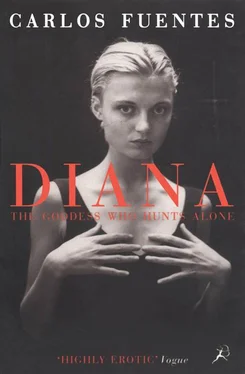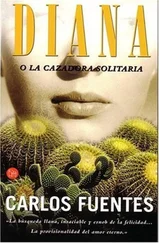Carlos Fuentes - Diana the Goddess Who Hunts Alone
Здесь есть возможность читать онлайн «Carlos Fuentes - Diana the Goddess Who Hunts Alone» весь текст электронной книги совершенно бесплатно (целиком полную версию без сокращений). В некоторых случаях можно слушать аудио, скачать через торрент в формате fb2 и присутствует краткое содержание. Год выпуска: 2012, Издательство: Bloomsbury UK, Жанр: Современная проза, на английском языке. Описание произведения, (предисловие) а так же отзывы посетителей доступны на портале библиотеки ЛибКат.
- Название:Diana the Goddess Who Hunts Alone
- Автор:
- Издательство:Bloomsbury UK
- Жанр:
- Год:2012
- ISBN:нет данных
- Рейтинг книги:3 / 5. Голосов: 1
-
Избранное:Добавить в избранное
- Отзывы:
-
Ваша оценка:
- 60
- 1
- 2
- 3
- 4
- 5
Diana the Goddess Who Hunts Alone: краткое содержание, описание и аннотация
Предлагаем к чтению аннотацию, описание, краткое содержание или предисловие (зависит от того, что написал сам автор книги «Diana the Goddess Who Hunts Alone»). Если вы не нашли необходимую информацию о книге — напишите в комментариях, мы постараемся отыскать её.
Diana the Goddess Who Hunts Alone — читать онлайн бесплатно полную книгу (весь текст) целиком
Ниже представлен текст книги, разбитый по страницам. Система сохранения места последней прочитанной страницы, позволяет с удобством читать онлайн бесплатно книгу «Diana the Goddess Who Hunts Alone», без необходимости каждый раз заново искать на чём Вы остановились. Поставьте закладку, и сможете в любой момент перейти на страницу, на которой закончили чтение.
Интервал:
Закладка:
“Yes,” I replied, “but not with rifles. It took spears. The Aztec emperor Montezuma summoned everyone who’d dreamed of the end of his empire and the arrival of the conquistadors and had them put to death …”
He looked at his watch. It was seven. Time to leave. He wasn’t interested in the Aztecs, and Mexico seemed to him a protective wall topped with broken glass.
XXVII
I’m sitting opposite my wife, Luisa Guzmán, in the spacious living room of the house we shared for ten years in the cobblestoned neighborhood of San Angel. Each of us is holding a glass of whiskey, each stares at the other and thinks something, the same thing or something different from what the other thinks. The glasses are heavy, rounded, their thick, rippling bottoms like the eye of an octopus at the bottom of the Sargasso Sea. She’s also hugging her stuffed panda.
I look at her and tell myself we’ll have to do something that bears no resemblance to the rest of our lives. That’s what imagination is all about. But looking at her sitting opposite me, imagining her as she imagines me, I prefer to be clear and concise. During those years, Luisa Guzmán did not manage my social life (she was reclusive) or my financial life (she was supremely indifferent to money). She encouraged my literary life; she was patient about my work as a writer and reader. But what she did manage was my sexual life. Which is to say, she put up no obstacles to it. She thought that by standing aside she was ensuring my next return to her. That’s how it had always been.
In any case, sitting there watching her watch me, with all the burden of memory on our shoulders, I realized that each time she had been one step ahead of me. She could not conceive a fidelity that could withstand the success of my first book. At the age of twenty-nine, I attained a celebrity I myself didn’t celebrate very much. If there’s one thing I’ve always known, it’s that literature is a long apprenticeship that is always open to imperfection when things go well, to perfection when things go badly, and to risk at all times — if we want to deserve what we write. I didn’t believe the praise heaped on me, because I knew I was far from achieving the goals I imagined; I didn’t believe the attacks either. I listened to the voices of my friends, and they encouraged me. I listened to my own voice, and all I heard was this: “Don’t accept success. Don’t repeat it superficially. Set yourself impossible challenges. It’s better to fail by taking the high road than to triumph on the low road. Avoid security. Take chances.”
I don’t know when exactly in our relationship Luisa felt I needed more, needed something more but needed her as well — something that would be the erotic equivalent of literary risk. Or ambition. We laughed a lot when, a week after we fell in love, a very famous Mexican writer visited and berated her for preferring me to him. “I’m handsomer, more famous, and a better writer than your boyfriend.”
Our astonishment was due, more than to anything else, to the great author’s continuing his friendship with her and with me, undeterred. His delirious plea for her hand (or a change of hands) had failed, but his amiable smile never did. Nor did, and this we knew from the start, his limitless ambition — so genial, so well founded, even though he took a dim view of it — to achieve power and glory through writing. Luisa showed me (or confirmed me in the certainty) that it’s better to be a human being than a glorious author. But at times being a person involves greater cruelty than the naĩve promise of literary fame.
Now, as we sat opposite each other, there was no need to tell her I couldn’t do without Diana Soren; hugging her stuffed panda, a glass of whiskey in her hand, she reproached me, without saying a word, for all the accumulated cruelty in our relationship and threw in my face the ease with which I used the mask of literary creation to disguise it. Her eyes told me: You’re ceasing to be a person. As long as you were, I respected your love affairs. But I’ve just now realized you don’t respect yourself. You don’t respect the women you sleep with. You use them as a literary pretext. I refuse to go on being one.
“It’s your fault. You should have drawn the line the first time I was with another woman.”
“Tender and evil. How do you expect …?”
“For years you’ve put up with my infidelities …”
“Excuse me. I can’t compete anymore with all these imaginative efforts and the fantasy of all the women in the world …”
“By maintaining our love, we ended up killing it — you’re right …”
She hurled the glass, heavy as an ashtray, at me, hitting my lower lip. I gave the melancholy panda a melancholy look, stood up, rubbing my painful lip, and left forever.
XXVIII
I didn’t find Mario Moya. He was at a conference on population growth in Bucharest and wouldn’t be back for two weeks. I shrugged and hoped the matter could wait. That was more or less the amount of time it would take to finish filming in Santiago. Then all of us would go back to … Where would Diana go? Where would I go? Would we stay together? I doubted it. Her husband was waiting for her in Paris. In Los Angeles, a Black Panther whom she talked to on the telephone at three in the morning. In Jeffersontown, Iowa, an idealized lost boyfriend, a midwestern Tristan who by now, perhaps, was a potbellied pharmacist, swollen with Miller beer, a fanatical Chicago Cubs fan.
I had no illusions. She wouldn’t go along with me to some idyllic ivy-covered American campus. What I didn’t want was for anything to interrupt present time, our time together in Santiago and later, with a little luck, a few days in Mexico City, a rendezvous in Paris … I did have illusions of our spending a summer together on Mallorca, an island we both adored, where I had recently spent time exploring with a marvelous friend, the writer Hélène Cixous, and where Diana and Ivan had a house …
Anything, I told myself on the flight back to Durango, anything but losing her for these last two weeks. One possibility came to my mind incessantly, excluding all others. I was her lover because they would not allow her real lover, the leader of the Black Panthers, to enter Mexico. Should I anticipate her rebuff, the break between us? Should I be the one to take the initiative and break with her before she, going even further, abandoned me, left, and forgot everything we were?
I had called her a few times from the capital. I have a hard time communicating by telephone. The invisibility of the person I’m talking to fills me with impatience and anguish. I can’t match the words with the facial expression. I can’t know if the person talking to me is alone or with someone, dressed or naked, made-up or clean-faced. The more technology advances, the more we compensate for our moral or imaginative deficiency with the only weapon available: lies. I’ve just stepped out of the shower. I’m naked. I’m just walking out the door. I’m sorry. I’m alone. I’m alone. I’m alone.
“I love you, Diana.”
“Words are very pretty and don’t cost much.”
“I miss you.”
“And yet you aren’t here. Well, well.”
“I’ll be back on Friday. We’ll spend the weekend together.”
“I’m dying of impatience. ’Bye.”
I didn’t have time to tell her that I was afraid for her, that she should watch out, that it was for that reason I’d gone to the capital, to try to find something out and protect her. But my relations with the Díaz Ordaz government were terrible. I had only one friend in it, my schoolmate Mario Moya, Undersecretary of Internal Affairs, and he was away.
“I came here for your sake, Diana. I’m here because of you,” I would have wanted to shout to her, but I was uncertain about things. There was no hurry, I told myself. I was much more concerned now with knowing what her expression had been when she spoke so abruptly to me. Would that be the next technological advance — a telephone with a screen so we can see the face of the person speaking to us? What an atrocious violation of our privacy, I told myself, what infinite complications: always being ready, hair combed, makeup fresh, dressed (or undressed, depending). Or quickly messing up one’s hair to justify one’s drowsiness: “You woke me up, darling. I was sleeping — alone.” And a paunchy, bearded guy in a T-shirt next to her, watching football on television and chugging a mug of beer.
Читать дальшеИнтервал:
Закладка:
Похожие книги на «Diana the Goddess Who Hunts Alone»
Представляем Вашему вниманию похожие книги на «Diana the Goddess Who Hunts Alone» списком для выбора. Мы отобрали схожую по названию и смыслу литературу в надежде предоставить читателям больше вариантов отыскать новые, интересные, ещё непрочитанные произведения.
Обсуждение, отзывы о книге «Diana the Goddess Who Hunts Alone» и просто собственные мнения читателей. Оставьте ваши комментарии, напишите, что Вы думаете о произведении, его смысле или главных героях. Укажите что конкретно понравилось, а что нет, и почему Вы так считаете.












